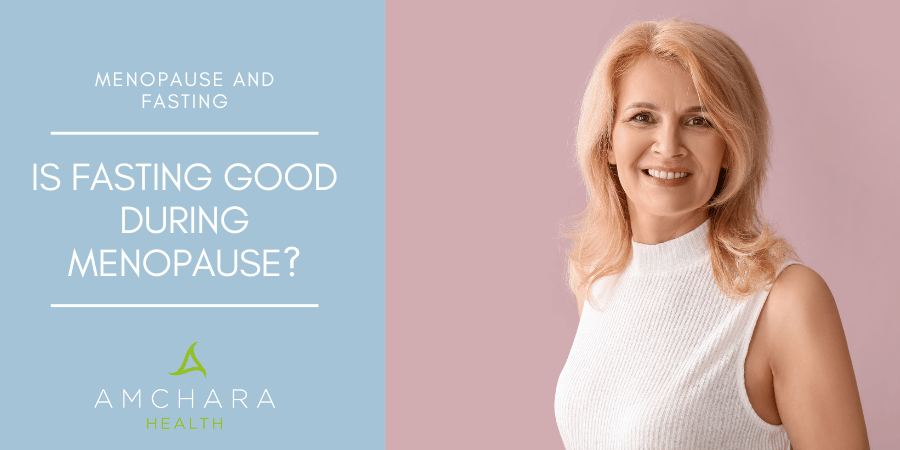Topics Covered in this article:
Women will typically experience the menopause between the age of 45 and 55 – the natural halt to your menstrual cycle and the beginning of a new chapter of your life. It’s a time when your body reduces the production of oestrogen, the hormone that makes it possible to reproduce and have periods.
Symptoms of the menopause can begin up to 10 years before the onset of menopause (this is known as perimenopause) and can include the following:
These symptoms can vary in severity from very minor to having a large and detrimental impact on daily life and self-esteem.
We always take an evidence-based approach and aim to provide you with actionable knowledge and tips to help you on your journey to optimal health.
In this article we’ll take a closer look at the evidence behind fasting during the menopause, and whether this may help to boost your health, happiness and wellbeing during this period of transition.
Warning
Whilst generally considered safe, it is important to note that fasting can be dangerous if you are pregnant or breastfeeding, have diabetes, have a history of eating disorders or are on certain medications. Always check with your health practitioner if any of these apply to you.
What is intermittent fasting?
Intermittent fasting is an umbrella term describing a variety of ways of fasting utilising different meal timing schedules – intermittent fasting essentially means switching between periods of fasting and non-fasting (eating normally) over a certain amount of time.
There are many different approaches to intermittent fasting including the following:
The impact of declining oestrogen during the menopause
This is a complex period of change in women’s lives, with many different factors affecting women during the menopause.
Declining levels of oestrogen impact many bodily functions, not least the gut. The collection of millions of bacteria, fungi, viruses and other microorganisms in your gut is referred to as the gut microbiome. A diversity in the gut microbiome is key to supporting many aspects of health. Specific microbiomes, referred to as the estrobolome, work to regulate circulating levels of oestrogen, and impacting how the body enables oestrogen to be turned into active forms.
Oestrogen works with the good bacteria in your gut, so when you experience a decline in oestrogen, this can impact the overall balance of bacteria, as well as how oestrogen is absorbed and activated, which can affect gut functioning as well as influencing mood, as a result of the complex relationship between the gut and the brain.
During the menopause, fluctuating oestrogen levels can make it harder to control and regulate cortisol (the ‘stress’ hormone), which can lead to increased stress levels. Excessive or chronic stress can impact your digestive health – too much cortisol slows down the digestive system, which can contribute to digestive complaints such as bloating and constipation.
It should also be noted that extended fasting periods can also create a stress response in the body by increasing the production of cortisol – extreme fasting is not to be recommended during this time of change.
Benefits of fasting
There are many reported benefits of fasting on the body including:
It is thought that these benefits are partly attributable to the state of autophagy that fasting brings. This can be described as ‘housekeeping’ for your body – a metabolic switching that relieves pressure on the digestive system, enabling the body to switch from burning readily available glucose from food intake for energy, instead burning stored fat, essentially cleaning your cells by recycling cells’ existing resources.
We can see that the above benefits could be beneficial during the menopause, in potentially encouraging weight loss as well as boosting overall health and wellbeing.
One study found that women eating in four-hour and six-hour windows over a period of eight weeks experienced weight loss of 3% to 4% of their baseline weight throughout the course of the study, compared with the control group, which had almost no weight loss.
The women in the time restricted eating study also saw a drop in insulin resistance and in biomarkers of oxidative stress.
Takeaway
At Amchara, we always aim to guide you through evidence-based, scientific research. So if you are beginning your journey through this new phase in your life, if you’re already on your way or even if you’re postmenopausal, our Personalised Health practitioners can recommend healthy and natural ways to manage your symptoms and help you find out how fasting could support you during this time of change.
Come to our nurturing environment at Amchara, where our experienced Personalised Health practitioners can work with you to explore positive lifestyle choices to help you achieve your health goals, with a tailored approach taking into account your individual circumstances, and aimed to help you maximise your health gains.
Juicing and fasting may be recommended, according to your personal situation and unique health needs. You will be immersed in a supportive and nurturing environment that enables you to switch off, relax and kickstart your health journey, including physical activities and empowering, educational talks.
Or you could try Amchara Juicery – cold-pressed, nutritious juices delivered to your door to help you boost your health, naturally. Created by Amchara’s expert in-house health team, you can enjoy a range of fresh, organic juice cleanses (and super soups) at home.
We know that sharing knowledge and experiences can be an important part of achieving optimal health, we’d love to know if you have found fasting beneficial during the menopause and what other strategies have worked for you to help navigate this time of change.




